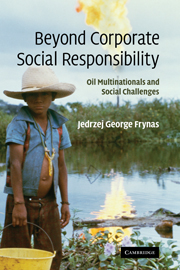Book contents
- Frontmatter
- Contents
- List of figures
- List of tables
- Chapter 1 Introduction
- Chapter 2 The logic of CSR strategies
- Chapter 3 The context of CSR
- Chapter 4 The environmental challenge
- Chapter 5 The development challenge
- Chapter 6 The governance challenge
- Chapter 7 Conclusions and recommendations
- Glossary
- References
- Index
Chapter 6 - The governance challenge
Published online by Cambridge University Press: 27 July 2009
- Frontmatter
- Contents
- List of figures
- List of tables
- Chapter 1 Introduction
- Chapter 2 The logic of CSR strategies
- Chapter 3 The context of CSR
- Chapter 4 The environmental challenge
- Chapter 5 The development challenge
- Chapter 6 The governance challenge
- Chapter 7 Conclusions and recommendations
- Glossary
- References
- Index
Summary
This chapter evaluates the potential of the current CSR agenda for addressing issues of governance. While extractive industries such as oil and gas generate relatively few jobs and local economic linkages compared with manufacturing or services industries, they have been blamed for distorting national economies and undermining good governance. Many oil-producing countries have suffered from the phenomenon known as the ‘resource curse’. Despite being well endowed with natural resources, oil-producing countries have experienced economic underdevelopment, political mismanagement and military conflict, a finding supported by many quantitative and qualitative studies and accepted by World Bank and IMF economists (Gelb 1988; Ross 1999; Sachs and Warner 1999, 2001).
There are three principal negative societal effects of natural resource exports, which have been called the ‘resource curse’:
Impact on the economy. Large foreign exchange inflows generated by extractive industries exports lead to the appreciation of a country's currency exchange rates, which makes it more difficult to export agricultural and manufacturing goods – a phenomenon known as Dutch disease. Extractive industries also draw capital, labour and entrepreneurial activity away from non-resource sectors such as manufacturing and agriculture, thereby stifling the development of those sectors. Not surprisingly, it has been shown that resource-rich countries have had lower economic growth rates than countries without these resources over the long term (Corden 1984; Sachs and Warner 1999, 2001).
Impact on governance. Extractive industries exports may undermine good governance and political accountability to society. Given their dependence on extractive industries revenue, governments in resource-rich countries may neglect non-resource taxation and may have fewer incentives to nurture other economic sectors and improve the quality of institutions. It has been shown that resource-rich countries have higher levels of corruption and lower levels of education than non-resource rich countries (Gylfason 2001; Leite and Weidmann 1999).
[…]
- Type
- Chapter
- Information
- Beyond Corporate Social ResponsibilityOil Multinationals and Social Challenges, pp. 134 - 164Publisher: Cambridge University PressPrint publication year: 2009
- 1
- Cited by



